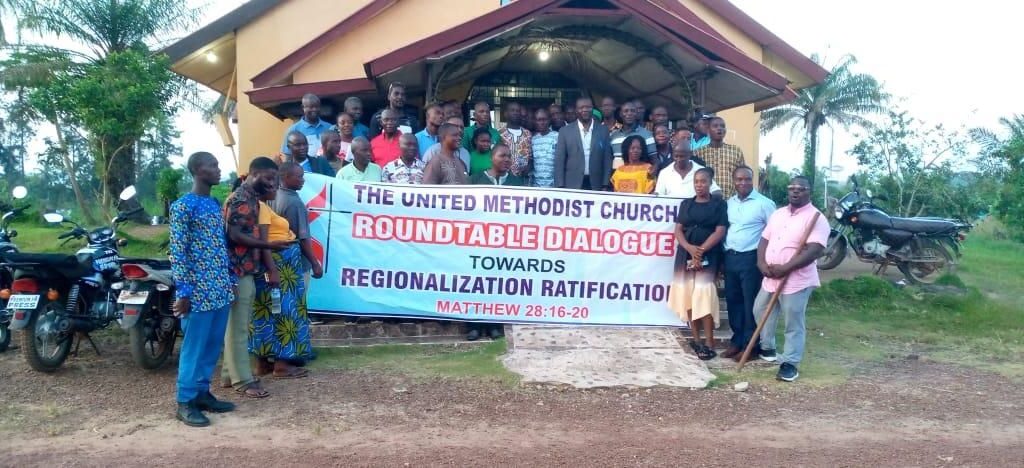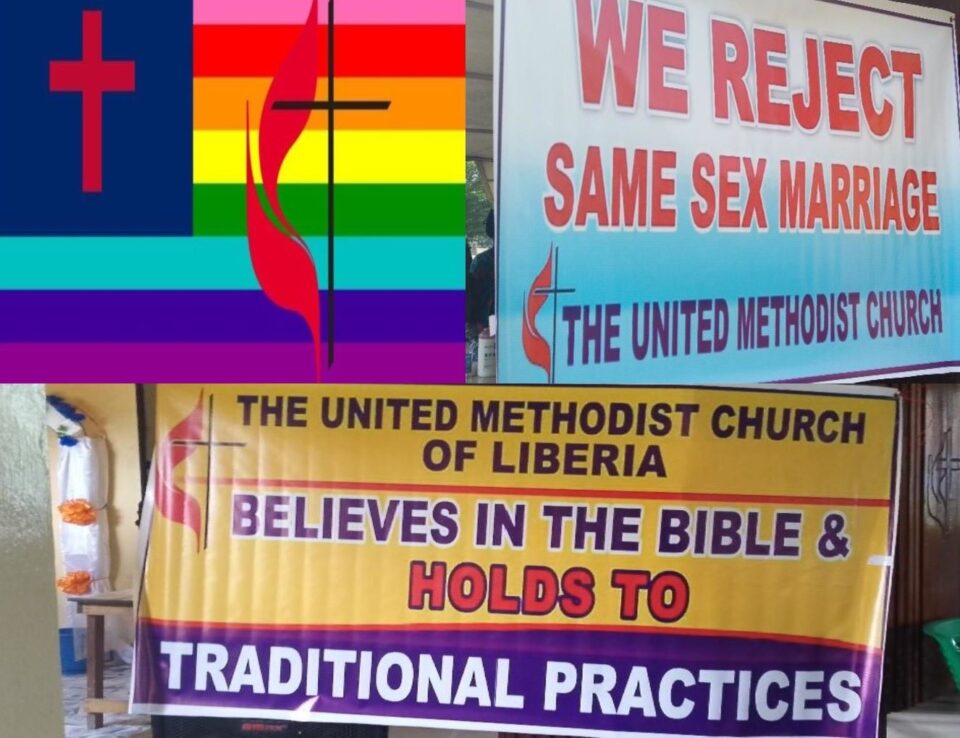In Gbarnga: “Regionalization” Ratified By 6 Large UMC Districts, Say NO To Same Sex Marriage
By J. Peter S. Dennis, dennisrealone@gmail.com
GBARNGA, Liberia—The ongoing feud in the United Methodist Church (UMC) in Liberia over whether or not to accept Same Sex marriage in line with the decision taken recently by the US General Conference has taken a new twist, with 6 large UMC districts taking a position on “Regionalization”.
“Regionalization,” a new term emerged from the 2024 General Conference of the United Methodist Church allows countries and geographically related areas to localize rules and doctrines relative to their context. Except the United States Region of the UMC, the eight other regions in Africa, Europe and Philippines have the advantage to adapt “regionalization” provision of the UMC. At A Meeting In The US: United Methodist Church Holds Historic Vote in Favour Of LGBTQ Inclusion – News Public Trust
The United Methodist Church in Nimba, Bong and Lofa, Liberia’s northcental region of Liberia has gone ahead of the controversial February 2025 Liberia Annual Conference Session on which UMC Bishop Samuel Quire hangs all his hope. Convening a special session after the May 2024 General Conference has been at the core of the controversy between Bishop Samuel Quire and some of his high-level ministerial colleagues.
Methodists at the Gbarnga even displayed several banners containing messages affirming the church’s traditional beliefs, including: “The United Methodist Church is not a gay church. We reject same-sex marriage” and “The United Methodist Church of Liberia believes in the Bible and holds to traditional practices.”

The Gbarnga event, held from November 14-16, 2024 at the Saint John United Methodist Church, brought together church leaders, clergy, conference lay leaders, and District Superintendents from Lofa River, Kokoyah, Weala, Jorquelleh, Gbarnga, Tappita, and Gompa Districts to discuss and refine the church’s approach to regionalization.
Recently Methosdist Bishop Samuel Quire revealed that his life has been threated in the wake of the the deepening rift in the Church. As Controversy Over Gay Marriage Deepens, Methodist Bishop Quire Says He Faces Death Threat – News Public Trust
Objective of the Regionalization Plan
The Regionalization Plan seeks to restructure the UMC’s governance, allowing for more localized decision-making and responses tailored to the diverse needs of its global congregations.
The estimated population of Methodists in Liberia—about 300 thousand. Nimba-two districts, Bong, three districts, Lofa-one districe (There are 500 local UMC churches in the 20 districts
Other districts gearing up to follow suit—Monrovia, St. Paul, Kakata, Farmington River, St. John River, Grand Bassa, Rivercess, Cape Palmas, Garraway district, the home district of Bishop Quire) and Kru Coast in Grand Kru County, Nanakru, Barrobo, Sinoe district, Morweh,
The initiative is part of the church’s efforts to ensure greater inclusivity, cultural sensitivity, and operational efficiency across its ministries. The plan aims to grant increased autonomy to regional conferences, enabling them to address unique challenges within their specific cultural and socio-economic contexts while maintaining the unity of the global church body.
Solidarity from Sierra Leone Annual Conference
The dialogue was enriched by the support of a delegation from the Sierra Leone Annual Conference, showing solidarity with the Liberia Annual Conference.
Rev. Emmanuel Pewa, Senior Pastor of King Memorial United Methodist Church, emphasized that the “regionalization is not about same-sex marriage but about worshiping according to the church’s beliefs, culture, traditions, and constitution”.
“Regionalization is not about man and man getting married; it’s about worshiping according to our beliefs, culture, traditions, and constitution. The Sierra Leone Annual Conference stands in support of you during this time, and we urge Methodists to back regionalization,” said Rev. Pewa. He encouraged members to understand the UMC’s values, emphasizing that the church’s beliefs remain unchanged.
Bishop Samuel J. Quire Jr.’s remarks
Bishop Samuel J. Quire Jr., head of the Liberia Annual Conference, highlighted the importance of the dialogue, stating:
“This rectification process is crucial for ensuring that our church remains relevant and responsive to the needs of all our members. By embracing regionalization, we can empower local conferences to serve their communities more effectively.”
Bishop Quire also clarified misconceptions regarding the church’s stance on same-sex marriage, stating: “As you go through the education of regional legislation, our reorganization has nothing to do with same-sex marriage. The UMC is not a gay church.”
He encouraged positive engagement, urging members to dialogue constructively.
“Let’s dialogue positively to move our church forward. I proudly commend the Central Region for being committed and steadfast. Let’s do everything in our power to defend and strengthen our church.”
Key Facilitators and Topics Covered
The dialogue featured plenary sessions, breakout discussions, and feedback from church members on implementing the plan. Key facilitators included Cllr. Dr. Tolbert Nyeswah (Lay Leader), Dr. E. Julu Swen, and Rev. Caleb S.G. Dormah, who led the sessions at the Saint John UMC in Gbarnga, Bong County.
The topics covered included:
The presentation of the General Conference 2024 on Regionalization, the UMC/Liberia Annual Conference’s stance on same-sex marriage, Liberia’s constitutional laws regarding same-sex marriage, Biblical perspectives on regionalization and its application within the Liberian context and The steps and processes for Regionalization Rectification within the global church setting.
Strong Stance Against Same-Sex Marriage
During his presentation, Cllr. Dr. Tolbert Nyeswah emphasized that the United Methodist Church of Liberia will uphold its traditional beliefs.
“With my sweat, blood, and the Bible, I will give my all to ensure we remain UMC. The United Methodist Church preaches the Bible, not just its Book of Discipline. Same-sex marriage is against our country’s constitution, and we will not accept it in our church.”
Rev. Caleb S.G. Dormah, Chairperson of the Taskforce on the Regionalization Plan Rectification Committee, also reaffirmed the church’s commitment to its traditional values:
“This regionalization rectification dialogue is very educative and will provide a foundation for regionalized worship according to our tradition, culture, and constitution. We reject same-sex marriage, and the UMC is not a gay church.”
Future Dialogues
Participants also addressed potential challenges, such as maintaining theological consistency and ensuring equitable resource distribution across regions.
The event concluded with recommendations that will be forwarded to the United Methodist Church’s General Conference for consideration.
One participant expressed gratitude for the initiative, stating: “We are grateful for this dialogue because it prepares us for conversations in our districts and churches.”
Another added: “We joined the United Methodist Church on our own, and no one can force us to leave unless we choose to.”
As the church advances with its Regionalization Plan, additional dialogues are planned in other regions to gather more insights and refine the strategy.
A similar dialogue has already been held in Pleebo, Maryland County, preparing members for the Annual Conference scheduled for February 2025.
This just-ended dialogue in Gbarnga marks a significant step toward a more decentralized and adaptive church structure, one that honors the diverse expressions of faith within the United Methodist community worldwide.
Now, it appears that UMC members pushing for the Gay practice to be accepted in Liberia’s Methodist Church are on the back foot.

